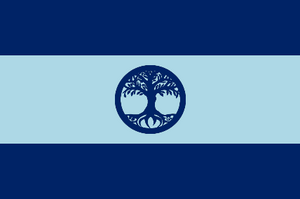President of Fratanica: Difference between revisions
(Created page with "Category:Fratanica {{Infobox official post | post = President of the Federal Republic of Fratanica | body = | native_name...") |
|||
| Line 58: | Line 58: | ||
== Relationship between Prime Minister and President == | == Relationship between Prime Minister and President == | ||
The President appoints the Prime Minister, with consent of a parliamentary majority. This usually means that the President appoints a Prime Minister popular with the majority parties or party coalition. The President can ask for the Prime Minister's resignation, however, they may not dismiss the Prime Minister. | |||
Constitutionally, the President is assigned the spheres of military and foreign policy, whereas the Prime Minister handles domestic and economic policy. However, if both the President and Prime Minister are from the same party, these lines become blurred. In this case, the President often becomes involved in all areas of policy ''de facto'', and it is decided by the President the amount of autonomy the Prime Minister has. | |||
If the Fratanican presidency and the [[National Assembly (Fratanica)|National Assembly]] are occupied by two opposing party coalitions, the President may be forced to appoint an opposition Prime Minister to the position. This is known as a state of {{wp|cohabitation}}. In these cases, the President's ability to influence policy or command the federal government declines greatly, due to political gridlock. | |||
== Succession and incapacity == | == Succession and incapacity == | ||
== Pay and official residences == | == Pay and official residences == | ||
Revision as of 01:41, 1 August 2021
| President of the Federal Republic of Fratanica | |
|---|---|
| Style | Mr. President (informal) His Excellency (formal) Commander-in-Chief (military) |
| Status | Head of state Executive president |
| Abbreviation | POF |
| Member of | Office of the President Fratanican Armed Forces National Security Council |
| Residence | Presidential Palace, Viras, Fratanica |
| Term length | 4 years, 2 term limit |
| Constituting instrument | Constitution of Fratanica |
| Precursor | President of the Fratanican Republic |
| Formation | August 19, 1941 |
| First holder | Bernard Petit |
| Salary | $152,440 NSD |
| Website | https://pof.fra.gov |
The president of Fratanica, officially the President of the Federal Republic of Fratanica, is the head of state of Fratanica and commander-in-chief of the Fratanican Armed Forces. The president is considered to be an executive president, holding power over both the armed forces and foreign affairs. The position was established on August 19th, 1941, just 2 days after the August 17th coup. The Fratanican presidency is considered the highest office of the land, holding great prestige as a position despite its limited governmental powers.
Under the Fratanican constitution, the President is the head of state of Fratanica. However, unlike other parliamentary republics, the President does have limited executive power and is not merely a figurehead. The Constitution delegates military and foreign affairs as responsibilities for the President, while economic and domestic policy is handled by the Prime Minister. The President was initially given one 6-year term with no chance at reelection, however, this was amended in 1968 to give a 4-year term with two term limit.
The current President is Lukas Wolf, who succeeded President Francisco Aguillon on September 18, 2020.
History
Roles and responsibilities
Relationship between Prime Minister and President
The President appoints the Prime Minister, with consent of a parliamentary majority. This usually means that the President appoints a Prime Minister popular with the majority parties or party coalition. The President can ask for the Prime Minister's resignation, however, they may not dismiss the Prime Minister.
Constitutionally, the President is assigned the spheres of military and foreign policy, whereas the Prime Minister handles domestic and economic policy. However, if both the President and Prime Minister are from the same party, these lines become blurred. In this case, the President often becomes involved in all areas of policy de facto, and it is decided by the President the amount of autonomy the Prime Minister has.
If the Fratanican presidency and the National Assembly are occupied by two opposing party coalitions, the President may be forced to appoint an opposition Prime Minister to the position. This is known as a state of cohabitation. In these cases, the President's ability to influence policy or command the federal government declines greatly, due to political gridlock.

